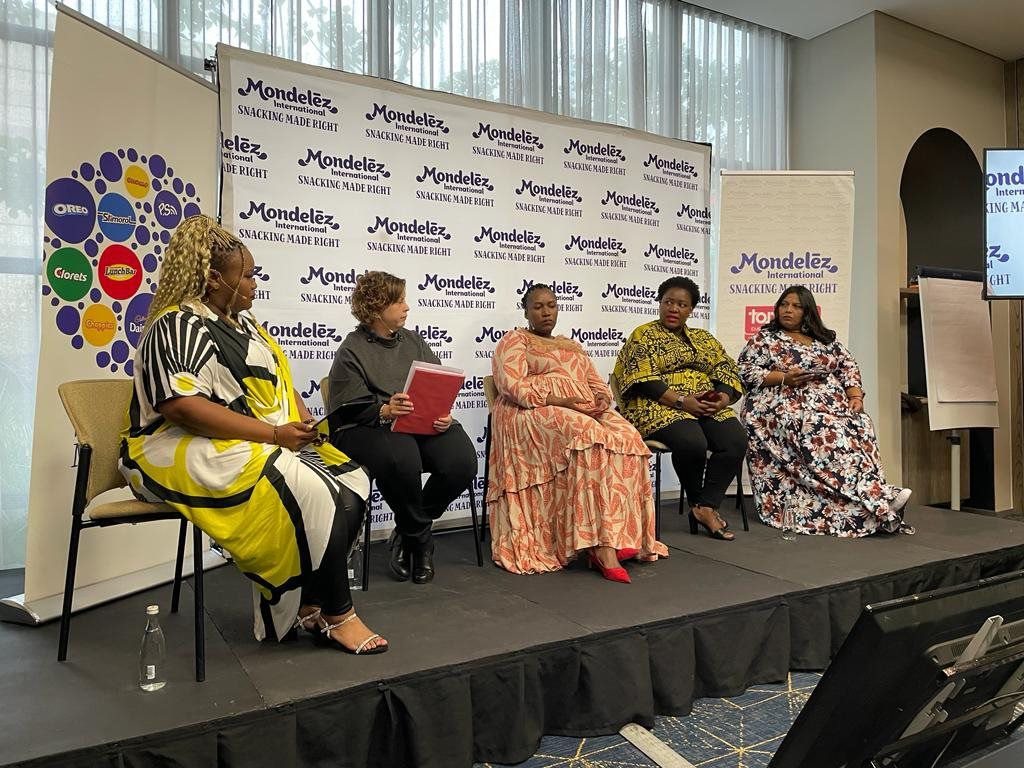"Yes!" was the resounding answer from the speakers at the recent Mondelez International and Top Employers' Institute panel discussion to moderator Bunny Majaja's question: "Is Africa the new talent pool of the world?"

Mondelez International and Top Employers’ Institute discussion panel (L-R): Bunny Majaja, Sandra Botha, Njabulo Mashingo, Cebile Xulu and Keshnie Martin
The panel comprised Cebile Xulu - people lead, sub-Saharan Africa at Mondelez International; Keshnie Martin - head of HR, Accenture Africa; Njabulo Mashingo - HR director, Vodacom SA; and Sandra Botha - HR auditor at the Top Employer Institute.
Xulu says that while Africa is viewed as an "emerging talent pool", it's not a new thing when one considers the number of service workers employed abroad: "We've always exported talent. I think now we're starting to see Africa exporting knowledge workers. So moving away from service, from hospitality, and moving towards tech [and] STEM ... qualifications and skills base. We are seeing a shift just in the skills that are being exported, and not necessarily the actual talent because we always exported talent to the rest of the world."
Mashingo believes Africa's demographic dividend will take us a long way in terms of our youth: "Many markets are struggling because they have an ageing population. If you look at Africa, we are on the rise in terms of just having the population and the numbers. The question is, is it the right quality of candidates and can we do more?"
Martin points out that there are many challenges facing young African talent in terms of education, infrastructure and political situations, while there are huge possibilities for them abroad. The continent is haemorrhaging skills as residents seek better opportunities for themselves and their families overseas.
Xulu concurs: "People resign and they say, 'Well, you've given us the employee experience that we were looking for but the country is not giving me the citizen experience that I expect.'"
So Africa's major challenge is to rectify these systemic issues in order to offer better opportunities to its own people and retain its homegrown talent.
Remote and hybrid workforces
"Coming out of the pandemic, where everybody's lifestyles have changed and people's needs and desires have changed in terms of focusing more on personal aspirations, as well as the professional - it's around how we adjust to accommodate that," continues Martin. African organisations have to embrace hybrid working and make an effort to understand their employees needs in order to retain and not lose talent.
Xulu agrees, saying that younger people are looking for hybrid or remote opportunities where they are allowed to manage their own time and office schedule, rather than being told where they have to be and when.
Mashingo says this points to a shift in the corporate power dynamic: "Talent won long ago because [they] vote with their feet while we're still debating things." Employees these days now hold much more power and businesses need to take a segmented rather than generic approach to their employee value propositions (EVPs). She suggests taking a hard look at what the company is aiming to attract, such as women or digital talent, and making a real investment into an EVP that speaks specifically to those demographics.
Talent development
Xulu says that where she has seen multinationals lacking is in the transfer of skills and knowledge to the locals working in African operations: "There's definitely the recognition that we do have the talent, but I'm not sure whether there is willingness to invest in the talent that we have, and not just bringing in external talent all the time onto the continent.
"I don't think the companies that set up are intentional about leaving a lasting legacy in terms of developing the local talent," she continues, stating that while Africa needs foreign investment, this needs to be done in a sustainable way that will "build the local talent and leave Africa able to stand on its own two feet".
"The Covid pandemic was really the trigger of organisations realising that there is this gap in terms of the skills we're going to require," says Botha. These skills include critical thinking and innovation, complex problem-solving, as well as technology, design and programming. "And then last but not least, resilience and flexibility is becoming more and more important."
Botha explains that companies are incorporating this by updating frameworks to ensure that while they are developing leaders, they are also developing these skills. But this is not just for leaders, it's for employees too. "[Organisations are] really looking at super-personalising these leadership development programmes. It's not just a one-size-fits-all anymore. It's really to understand from our employees, what are the unique gaps, and then how can we close that?"
Understanding employees
"One of the biggest challenges that we face now as HR professionals is the focus on data analytics, making sure that we understand how to interpret the data that is now at our disposal using some of the systems that a lot of companies have invested in. And this is something that is quite new," says Xulu.
"You have to almost take the same learnings that we've seen from marketing in terms of how they studied the consumers, and they use those insights to determine what sort of products are they going to be proposing to the business to make, to meet the consumer needs and the consumer expectations.
"There's a lot of work that goes into understanding the consumer but I think as HR professionals, we are now being stretched to adopt the same mindset. Do we really understand the talent landscape?" Xulu asks. It's not what one thinks should be the experience, "it is what the talent expects when they come into the organisation."
Xulu says it is this data-driven decision-making capability that HR professionals really need to embrace in order to have a meaningful impact on the talent decisions being made by organisations. The cookie-cutter approach HR has always taken is no longer going to work because employees want different things.
Impactful leadership
"The last thing I wanted to touch on in how we actually make sure that we keep the talent here, is leadership," Xulu advises. "There is something to be said about African leadership - that it's still very much hierarchical; that it's still very much unapproachable [and] fixated on, 'I am the adult, you're the child. You will not tell me anything. I'm the only one that can mentor you and there's nothing that I can learn from you.'
"If we're still going to run organisations as if we're running a tribal council, it's not going to work and young people are not going to stand for that. They will definitely go elsewhere, where their voices are heard, where they feel that they can actually make a meaningful contribution to the business."
Xulu says there is much 'unlearning' that leaders need to do to understand the new generation of talent - their career trajectory is much shorter and the curve not as steep; they are able to learn things that much quicker simply because of the technology that is available now.
Referring to one of Accenture's global studies, Martin says, "If you focus on the moments that matter for your employees, then enhancing that employee experience by being there, by caring, by being better leaders, you actually unlock five times more human potential in terms of what people can achieve, what people can deliver, the innovation, the creative thinking. It's focusing on how do you make it a better place for your employees."


























